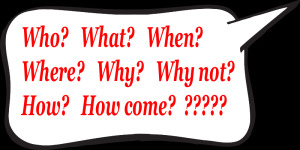 What do you think? Helps or hurts?
What do you think? Helps or hurts?
Do you agree? Yay or nay?
Why or why not? What are your thoughts?
What’s with all the questions? Or as my teens would ask, “What’s with the third degree?”
We pay attention when questions are asked – the brain is put into problem solving mode – what’s being asked of me here? The brain’s logical thinking center – the highly evolved neocortex – likes nothing better than having a problem to solve, solving most problems by searching its vast store of neural memories for a previous experience that the new experience can be likened to.
In a flash when it hears a question, the brain wakes up and starts processing. Where’s the pattern? What are the similarities and differences to the pattern? Is this a new experience with no memories to draw on? But is it at all similar to any prior experience? A question triggers instant activity, as the brain recognizes that something – an answer – is expected of it, and the brain can’t help but want to comply. Even if the questioner is not actually present to hear the answer. Even if the question is not totally relevant. Even if the question is foolish.
When the questioner is in front of you, the response may be another question: “Why do you ask?” Or a declarative comment: “That’s a stupid question.” Or even the honest but rudely stated: “I don’t have to answer that.” But when read, without the questioner present, it’s another matter.
The written question when heard internally by the reading voice in your head wakes up the brain. Quickly it assesses. This is not business as usual (i.e. a fact, to check or not check); now there is some work to do. I need to think about this (even if only briefly, even if I don’t logically want to,). Right now.
The influential question mark can change everything in the blink of an eye. Think you knew something? Think again.
Know the power of a question mark. Use the power advantageously. If only…?
Now the question becomes: how to persuade the reader to take the desired action. Want to know more? Now you do.
Next time the topic is: What you see is what you get – we see pretty much what we want to see, and are largely blind to everything else. This can work in your favor if you know what to do with it.
Comments? What are your thoughts, or pressing questions?
